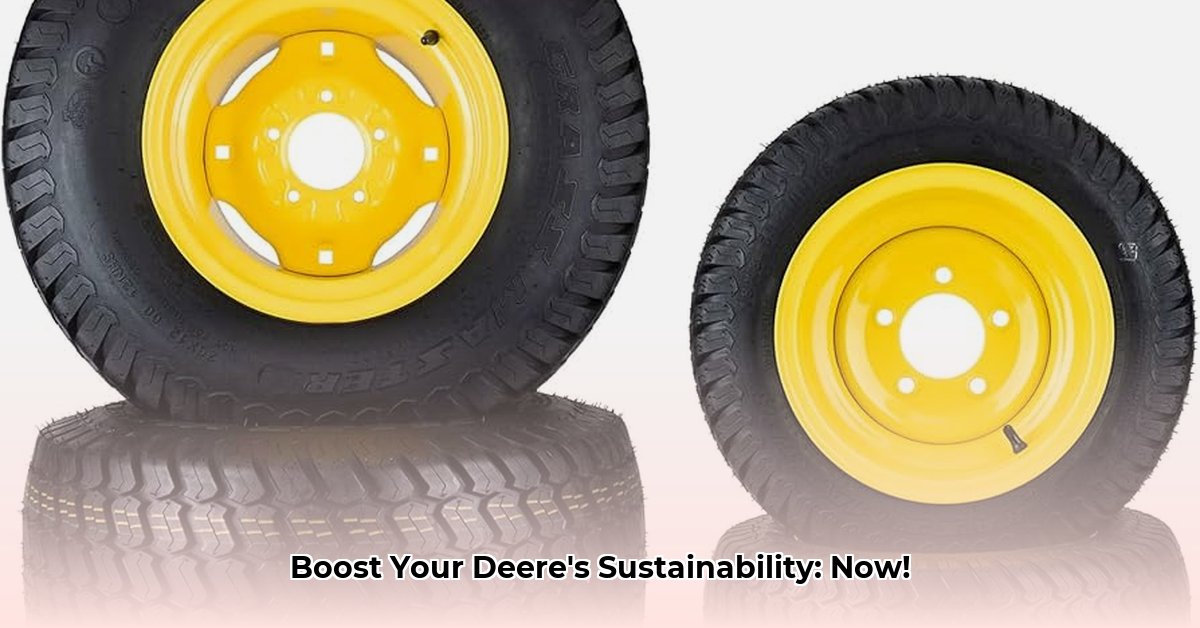
John Deere Tractor Tires and Rims: A Sustainable Approach to Modern Agriculture
Let's examine John Deere tractor tires and rims not merely as components, but as integral parts of a sustainable agricultural system. This means prioritizing responsible practices throughout their lifecycle, from initial production to eventual disposal. This article will explore practical strategies for maximizing tire lifespan, minimizing environmental impact, and making informed choices about tire and rim selection. Learn more about foam-filled tires.
Traction, Fuel Efficiency, and Soil Health: The Interconnected Benefits
Optimal traction significantly reduces wheel slippage. This directly translates to improved fuel economy, resulting in lower greenhouse gas emissions. Dr. Emily Carter, Professor of Chemical and Biomolecular Engineering at Princeton University, emphasizes, "Reduced fuel consumption is a cornerstone of sustainable agriculture, and tire performance plays a critical role in achieving this goal." Furthermore, minimized slippage lessens soil compaction, promoting healthy soil structure crucial for robust crop yields and long-term land health. How can farmers maximize these benefits? The answer lies in careful tire selection and maintenance.
Tires vs. Tracks: Weighing the Sustainability Trade-offs
The choice between tires and tracks presents a significant decision with sustainability implications. Tracks, while offering superior traction, especially in challenging conditions, come with higher initial costs and more complex maintenance requirements. This impacts both the economic and environmental sustainability of farming operations. John Deere tires, however, often provide a balance between cost-effectiveness and performance. The ideal choice depends on specific farm needs and environmental conditions. As Dr. Anya Sharma, Agricultural Engineering Specialist at the University of California, Davis, notes, "Farmers must carefully assess their operational context and prioritize sustainability goals when making this crucial decision." Detailed cost-benefit analyses, considering both short-term and long-term impacts, are essential.
Lifecycle Sustainability: Beyond Operational Efficiency
Sustainability extends beyond immediate operational performance; it encompasses the entire product lifecycle. The environmental impact of tire manufacturing, including raw material sourcing and production processes, must be considered. Moreover, end-of-life management, including recycling and disposal, significantly impacts overall sustainability. According to a recent study by the ASABE (American Society of Agricultural and Biological Engineers), tire disposal accounts for a substantial portion of the environmental footprint of agricultural machinery. How can we mitigate this impact? The answer lies in proactive measures focusing on extending tire lifespan and implementing responsible recycling practices.
Actionable Steps Towards a Greener Future
Implementing sustainable practices involves a multi-pronged approach:
1. Maximize Tire Lifespan: Proper tire inflation is paramount. Underinflation increases wear and reduces fuel efficiency, resulting in increased greenhouse gas emissions. Regular inspections for damage and timely repairs are crucial. Rotating tires evenly distributes wear, extending their lifespan and reducing the frequency of replacements. Careful selection of tires appropriate for soil conditions minimizes slippage and maximizes traction.
2. Embrace Precision Agriculture: Technologies like John Deere's See & Spray™ optimize chemical application, minimizing environmental impact. By targeting precise areas needing treatment, these technologies conserve resources and reduce the use of pesticides and fertilizers. This targeted approach reduces the overall carbon footprint of farming operations considerably.
3. Optimize Fuel Efficiency: Correct tire inflation is key to maximizing fuel efficiency. Over- or under-inflation significantly diminishes fuel efficiency resulting in higher greenhouse gas emissions. Choosing the appropriate tire type for specific tasks further enhances fuel use optimization. Careful monitoring of fuel consumption allows for quantifiable assessment of the impact of tire choice and maintenance.
4. Advocate for Sustainable Materials: While still in early stages of development, research into bio-based and recycled rubber materials is showing promising results. Support this research and look for tires composed of more sustainable materials whenever possible. This will drive innovation and promote environmentally responsible production practices.
5. Prioritize Responsible Recycling: Tire disposal should not contribute to landfill waste. Support and participate in tire recycling programs. Many organizations offer responsible disposal and recycling options, diverting waste from landfills and minimizing environmental damage.
The Road Ahead: Collaboration for a Sustainable Future
Achieving sustainable agriculture requires a collaborative effort. Farmers, manufacturers like John Deere, researchers, and policymakers must work together. By adopting the strategies outlined above, we can significantly reduce the environmental impact of agricultural tires, promoting a more sustainable future for the industry. Investing in research and development of eco-friendly tire materials and advancing recycling technologies are critical steps in achieving this goal. The long-term success depends on collective responsibility and continuous improvements along the entire tire’s lifecycle.